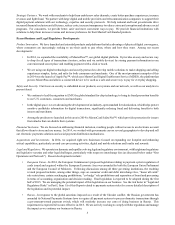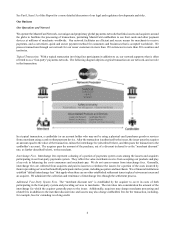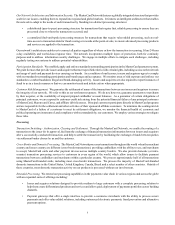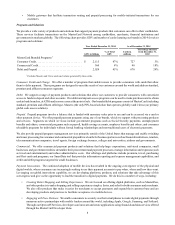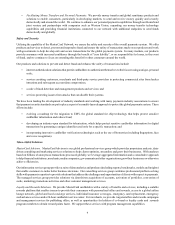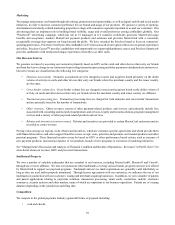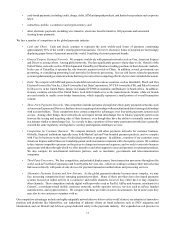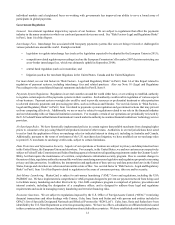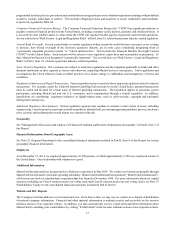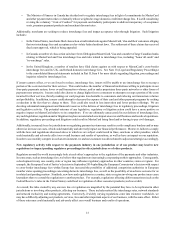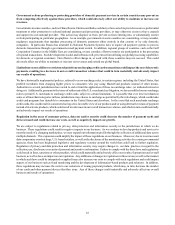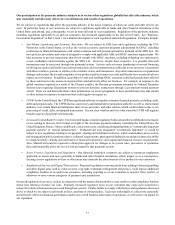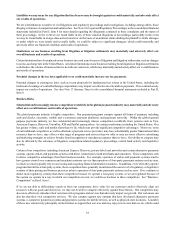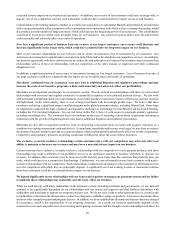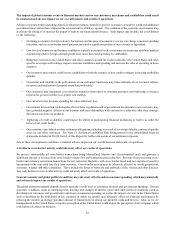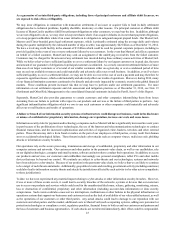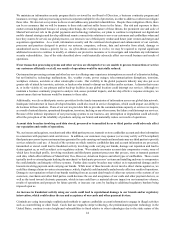MasterCard 2014 Annual Report Download - page 17
Download and view the complete annual report
Please find page 17 of the 2014 MasterCard annual report below. You can navigate through the pages in the report by either clicking on the pages listed below, or by using the keyword search tool below to find specific information within the annual report.15
• The Minister of Finance in Canada has decided not to regulate interchange fees in light of commitments by MasterCard
and other payment networks to voluntarily reduce weighted average domestic credit interchange fees. It is still considering
revising the voluntary “Code of Conduct” for payment card industry participants to address transparency of acceptance
costs, premium payment products and merchant discount rates.
Additionally, merchants are seeking to reduce interchange fees and impact acceptance rules through litigation. Such litigation
includes:
• In the United States, merchants filed class action or individual suits against MasterCard, Visa and their customers alleging
that our interchange fees and acceptance rules violate federal antitrust laws. The settlement of these claims has received
final court approval, which is being appealed.
• In Canada, a number of class action suits have been filed against MasterCard, Visa and a number of large Canadian banks
relating to MasterCard and Visa interchange fees and rules related to interchange fees, including “honor all cards” and
“no surcharge” rules.
• In the United Kingdom, a number of retailers have filed claims against us with respect to MasterCard’s cross-border
interchange fees and its U.K. and Ireland domestic interchange fees. See Note 18 (Legal and Regulatory Proceedings)
to the consolidated financial statements included in Part II, Item 8 for more details regarding litigation, proceedings and
inquiries related to interchange fees.
If issuers cannot collect, or we are forced to reduce, interchange fees, issuers will be unable to use interchange fees to recoup a
portion of the costs incurred for their services. This could reduce the number of financial institutions willing to participate in our
four-party payments system, lower overall transaction volumes, and/or make proprietary three-party networks or other forms of
payment more attractive. Issuers could also choose to charge higher fees to consumers to attempt to recoup a portion of the costs
incurred for their services, thereby making our card programs less desirable to consumers and reducing our transaction volumes
and profitability. In addition, issuers could attempt to decrease the expense of their card and other payment programs by seeking
a reduction in the fees that we charge to them. This could also result in less innovation and fewer product offerings. We are
devoting substantial management and financial resources to the defense of interchange fees in regulatory proceedings, litigation
and legislative activity. The potential outcome of any legislative, regulatory or litigation action could have a more positive or
negative impact on MasterCard relative to its competitors. If we are ultimately unsuccessful in our defense of interchange fees,
any such legislation, regulation and/or litigation may have a material adverse impact on our overall business and results of operations.
In addition, regulatory proceedings and litigation could result in MasterCard being fined and/or having to pay civil damages.
Additionally, increased focus by jurisdictions on regulating payment systems may result in costly compliance burdens and/or may
otherwise increase our costs, which could materially and adversely impact our financial performance. Moreover, failure to comply
with the laws and regulations discussed above to which we are subject could result in fines, sanctions or other penalties, which
could materially and adversely affect our overall business and results of operations, as well as have an impact on our reputation.
In order to successfully compete in such an environment, we and our customers would each need to adjust our strategies accordingly.
New regulatory activity with respect to the payments industry in one jurisdiction or of one product may lead to new
regulations (or impact pending regulatory proceedings) in other jurisdictions or of other products.
Regulators around the world increasingly look at each other’s approaches to the regulation of the payments and other industries.
In some areas, such as interchange fees, we believe that regulators are increasingly cooperating on their approaches. Consequently,
a development in any one country, state or region may influence regulatory approaches in other countries, states or regions. For
example, the European Court of Justice’s decision in September 2014 upholding the European Commission’s decision with respect
to cross-border interchange fees within Europe has increased the possibility of additional competition authorities in European
member states opening proceedings concerning domestic interchange fees, as well as the possibility of an adverse outcome for us
in related and pending matters. Similarly, new laws and regulations in a country, state or region involving one product may cause
lawmakers there to extend the regulations to another product. For example, regulations affecting debit transactions (such as the
Federal Reserve’s rules in the United States) could lead to regulation of other consumer products (such as credit).
As a result, the risks created by any one new law or regulation are magnified by the potential they have to be replicated in other
jurisdictions or involving other products, affecting our business. These include matters like interchange rates, network standards
and network exclusivity and routing agreements. Conversely, if widely varying regulations come into existence worldwide, we
may have difficulty adjusting our products, services, fees and other important aspects of our business, with the same effect. Either
of these outcomes could materially and adversely affect our overall business and results of operations.


